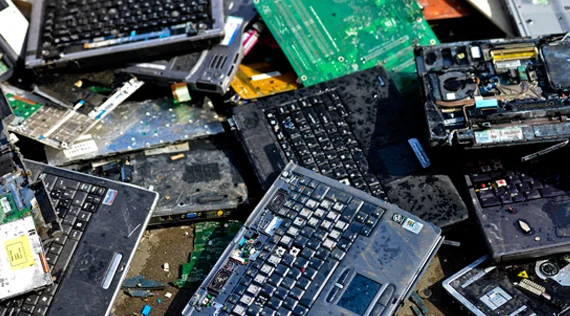
SEATTLE (Scrap Monster): Visibility of, and investment in, generative AI – programs such as ChatGPT, Midjourney, and other large language model (LLM) based technologies – has exploded in the past couple of years, bringing with it a whole host of benefits and drawbacks. But amongst all the existential dread and alarming levels of misinformation, there’s one far more practical concern that has so far gone unnoticed: what are we going to do with all the e-waste we’re creating?
“The e-waste generated by generative AI, particularly large language models, could increase dramatically – potentially reaching up to 2.5 million tons per year by 2030 if no waste reduction measures are implemented,” Asaf Tzachor, a sustainability and climate researcher at Reichman University in Israel, told DW recently.
And he should know: as co-author of a new study investigating the potential e-waste consequences of the sudden boom in generative AI tech, Tzachor and colleagues found that the amount of e-waste from generative AI computer servers could total as much as 5 million tons by the end of the decade – around 2,000 times the amount produced in 2023.
“We were surprised by the magnitude of the projected e-waste,” Tzachor told ABC News.
E-waste is already a big problem – as the United Nations points out, “the 62 million tonnes of e-waste generated in 2022 would fill 1.55 million 40-tonne trucks, roughly enough trucks to form a bumper-to-bumper line encircling the equator.”
And here’s the thing: tackling the problem is pretty much a win-win, since not only will it stop millions of people, including children, dying from exposure to toxic chemicals and pollution – but e-waste is also famously chock-full of super-valuable minerals and resources.
“There's more gold and silver in a tonne of iPhones than a tonne of ore from a gold or silver mine,” Lisa McLean, a member of the ministerial advisory group and chief executive officer of research and advocacy group Circular Australia, told ABC.
And with the projected amount of e-waste by 2030 being the equivalent of literally billions of said smart devices, trying to tackle this problem is really a no-brainer. “We're running out of the resources,” McLean pointed out, “and we're not going to get to net zero without a circular economy.”
Indeed, employing circular economy strategies could reduce e-waste generation by up to 86 percent, according to the study. That’s a best-case scenario – it could be as low as 16 percent – but it shows just how dramatic such interventions can be.
“The range of 16-86 percent reduction reflects the immense potential of these strategies, especially if supported by policies, and when widely implemented across industries and regions,” Saurabh Gupta, founder of India-based sustainability organization Earth5R, told DW (Gupta was not involved in the study).
“This presents a tremendous opportunity for reducing the waste stream if these practices are widely adopted,” Gupta said. “It's clear from this study that the nature of the e-waste crisis is global, which is why it's important to focus on cross-border e-waste management.”
So, what’s the solution? Well, there’s no silver bullet, but Tzachor highlighted a few strategies to help minimize the future onslaught of e-waste. First, we should aim to prolong the use of existing hardware – basically, use things for longer, rather than throwing them out as soon as the next shiny thing catches our eye. Second, we should aim to re-use or refurbish devices and components – which includes designing hardware so as to make this easier (we’re looking at you, Apple).
But perhaps the most important takeaway from the report? We don’t have time for complacency.
"It's far easier and more cost-effective to address the e-waste challenges posed by AI now,” cautioned Tzachor, speaking to DW. “Before they escalate beyond control.”
The study is published in the journal Nature Computational Science.
Courtesy: www.iflscience.com



| Copper Scrap View All | |
| Alternator | 0.41 (0.01) |
| #1 Copper Bare Bright | 4.30 (0.1) |
| Aluminum Scrap View All | |
| 356 Aluminum Wheels (Clean) | 0.80 (0) |
| 6061 Extrusions | 0.70 (0) |
| Steel Scrap View All | |
| #1 Bundle | 360.00 (0) |
| #1 Busheling | 380.00 (0) |
| Electronics Scrap View All | |